
Klaus Schulze was a German electronic music pioneer, composer and musician. He also used the alias Richard Wahnfried and was a member of the Krautrock bands Tangerine Dream, Ash Ra Tempel, and the Cosmic Jokers before launching a solo career consisting of more than 60 albums released across six decades.

Michael Shrieve is an American drummer, percussionist, and composer. He is best known as the drummer of the rock band Santana, playing on the band's first seven albums from 1969 to 1974. At age 20, Shrieve was the second youngest musician to perform at Woodstock. His drum solo during "Soul Sacrifice" in the Woodstock film has been described as "electrifying", although he considers his solo during the same piece in 1970 at Tanglewood the superior performance.

Electronic Meditation is the debut album by German electronic music group Tangerine Dream. It was released in June 1970 by record label Ohr.

Timewind is the fifth album by Klaus Schulze. It was originally released in 1975, and in 2006 was the twenty-second Schulze album reissued by Revisited Records. It is Schulze's first solo album to use a sequencer.

Moondawn is the sixth album by Klaus Schulze. It was originally released in 1976, and in 2005 was the thirteenth Schulze album reissued by Revisited Records. Moondawn is Schulze's first album that was performed in a full Berlin School style, as well as his first to feature contributions from drummer Harald Grosskopf.
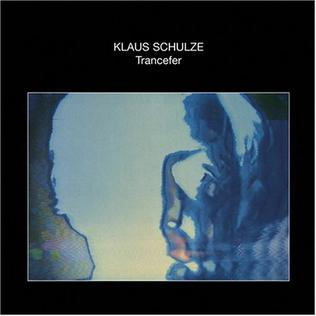
Trancefer is the fourteenth album by Klaus Schulze. It was originally released in 1981, and in 2006 was the twenty-third Schulze album reissued by Revisited Records. With the original total running time of 37 minutes and 23 seconds, it was the shortest album in Schulze's canon until the 2006 reissue doubled its running time by including alternate versions of the main tracks.

Irrlicht is the first album by Klaus Schulze. Originally released in 1972, in 2006 it was the sixteenth Schulze album reissued by Revisited Records as part of a series of Schulze album reissues. Recorded without synthesizers, Irrlicht's set of "early organ drone experiments" is "not exactly the music for which KS got famous".

Picture Music is the fourth album of electronic music by German musician Klaus Schulze. It was recorded in late 1974 and released in January 1975 on Brain Records. In 2005 this was the second Schulze album reissued by Revisited Records. This is the only Klaus Schulze solo album in which he can be heard playing a drum kit. Prior to his solo career, he was the drummer for Ash Ra Tempel; on his later albums, drummer Harald Großkopf of Wallenstein frequently contributed. Like many of his albums, this one has one long track on each side.

Dig It is the thirteenth album by Klaus Schulze. It was originally released in 1980, and in 2005 was the sixth Schulze album reissued by Revisited Records. It is Schulze's first fully digital recording. The 2005 reissue includes a bonus DVD with the video recording of the 1980 performance at Ars Electronica, which was previously released as audio on The Ultimate Edition (2000).

Dziękuję Poland Live '83 is the sixteenth album by Klaus Schulze. It was originally released in 1983, and in 2006 was the seventeenth Schulze album reissued by Revisited Records. "Katowice" is essentially a live version of "Spielglocken" from Audentity. "Lodz" is essentially a live version of "Ludwig II von Bayern" from X. "Dzien dobry!" is an alternate take of "Katowice"/"Spielglocken".
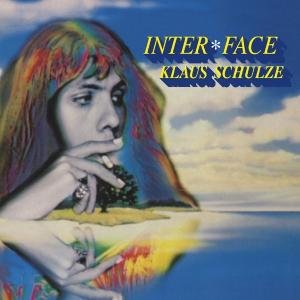
Inter*Face is the eighteenth album by Klaus Schulze. It was originally released in 1985, and in 2006 was the twentieth Schulze album reissued by Revisited Records. The two bonus tracks on the reissue were both previously released on Schulze's 25-disc CD box set Jubilee Edition (1997), which was later included on the 50-disc CD box set The Ultimate Edition (2000). However, a shorter version of "Nichtarische Arie" was included.

Beyond Recall is the twenty-third album by German electronic music pioneer Klaus Schulze, released in June 1991 by Virgin Records' subsidiary label Venture Records. This is the second of seven early-1990s Klaus Schulze albums not to be reissued by Revisited Records.

Das Wagner Desaster Live is the thirtieth album by Klaus Schulze. It was originally released in 1994, and in 2005 was the fifteenth Schulze album reissued by Revisited Records. The reissue of Das Wagner Desaster Live is one of two examples of a Klaus Schulze reissue that changes the original order of the tracks. Das Wagner Desaster Live was released after Schulze's Silver Edition 10-disc CD box set, technically making this album his fortieth.
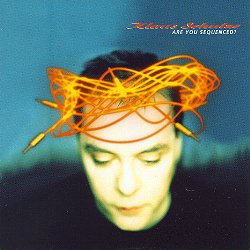
Are You Sequenced? is the thirty-second album by Klaus Schulze. It was originally released in 1996, and in 2006 was the eighteenth Schulze album reissued by Revisited Records. Are You Sequenced? was released after Schulze's Silver Edition and Historic Edition 10-disc CD box sets, technically making this album his fifty-second.

Dosburg Online is the thirty-third album by Klaus Schulze. It was originally released in 1997, and in 2006 was the twenty-first Schulze album reissued by Revisited Records. Dosburg Online was released after Schulze's Silver Edition and Historic Edition 10-disc CD box sets, as well as Jubilee Edition 25-disc CD box set, technically making this album his seventy-eighth. This is the second of two reissues not to feature a bonus track.

French Skyline is the second full-length album by the American electronic band Earthstar. It was their first release for Hamburg, Germany–based Sky Records.

La Vie Electronique is a series of multi-disc CD releases by Klaus Schulze, reissuing material from his limited edition 50-disc CD box set The Ultimate Edition (2000), which itself collected the previously released limited edition multi-disc box sets Silver Edition, Historic Edition, and Jubilee Edition, along with an additional 5 discs. The series began in 2009 with a plan to release all the music from The Ultimate Edition in chronological order. Four volumes were released in 2009, and four more were released in 2010. The next two volumes were released in 2011, with the next two following in 2012. The thirteenth volume was released in 2013, and the fourteenth and fifteenth volumes in 2014. The sixteenth and final volume, containing five CDs rather than the usual three, was released on May 29, 2015.
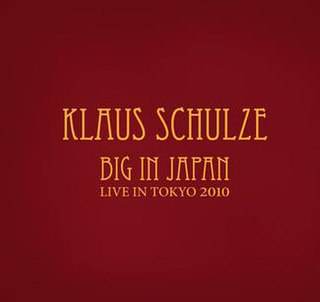
Big in Japan: Live in Tokyo 2010 is the fortieth album by Klaus Schulze. Taking in consideration the previously released multi-disc box sets, it could be viewed as Schulze's one hundred and first album. This album contains music from two final concerts at the Tokyo Kokusai Forum Hall in Tokyo, Japan on 20–21 March 2010 in Schulze's first and only visit to Japan. This is Schulze's first album without guest vocalist Lisa Gerrard since his 2007 album Kontinuum. The album was originally released on 22 September 2010 in Japan by Captain Trip Records as a limited edition deluxe boxed set of two CDs and a DVD with an 80-page photo book. This became known as the "Japanese Edition". A slightly different general release was released in Europe on 26 November 2010. This version, named the "European Edition", features a different track order between the CDs and the DVD, and slightly different track lengths. On 19 April 2011 a third version of Big in Japan was released in the United States. This "American Edition" consists of the same two CDs as the European version, but features a completely different DVD.

The Ultimate Edition is a limited edition 50-disc CD box set released by Klaus Schulze in 2000 collecting his previous limited edition multi-disc box sets Silver Edition, Historic Edition, and Jubilee Edition, which contain unreleased archival recordings in addition to new studio material. A further five discs were added for this release. Several discs were altered and restructured from their original versions: discs 7 and 8 were extended by five minutes; discs 11, 13, 14, and 22 were slightly remastered; and discs 41 and 42 were restructured. Two tracks from Jubilee Edition were omitted. The discs are divided into five boxes of ten discs, housed in individual cardboard sleeves. Between 2009 and 2015, tracks from this set were reissued as La Vie Electronique, a series of multi-disc CD sets releasing all the material of The Ultimate Edition in chronological order.
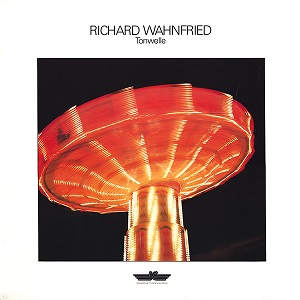
Tonwelle is the second album by Klaus Schulze released under the name of Richard Wahnfried. It was originally released in 1981, and was not reissued by Revisited Records as part of the overall reissue program of Schulze albums. A two-disc reissue was released in January 2012 by MIG Music, featuring different speeds from the original recording.




















